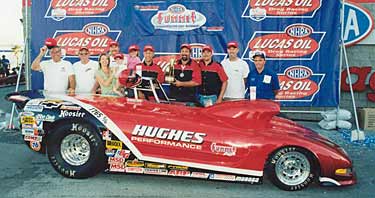| 
 Hughes’ dad, Bill, started the company
in 1969, along with mother Lorraine. They called it Hughes
Machine Co., a rebuilder of stock OEM converters located
in a 1,800 square-foot shop in Arizona. Bill Hughes, now
retired, came to Arizona to work for another trans company
and decided that it was time to open his own business.
Jim was 10 at the time, a sweeper of shop floors. Hughes’ dad, Bill, started the company
in 1969, along with mother Lorraine. They called it Hughes
Machine Co., a rebuilder of stock OEM converters located
in a 1,800 square-foot shop in Arizona. Bill Hughes, now
retired, came to Arizona to work for another trans company
and decided that it was time to open his own business.
Jim was 10 at the time, a sweeper of shop floors.
In 1977, the younger Hughes bought his first ’65 Chevelle,
a bracket car that Kevin later ended up crashing at a race
in Sonoma, California. It went from a streeter to a Super
Streeter to a Super Gasser, and went 8.80s when it was crashed.
In 1977, Jim Hughes started needing racing converters for
the Chevelle.
“With the stock OEM converters, you’d make those
in volume, whereas the racing converters take a lot more
time to build them,” he says. “But we had the
expertise to do it, and at the time, Dad thought it took
too much time to build a high-tech converter because there
was so much R&D work that needed to go into them. I actually
needed one for my own car. He wanted me to take one off the
shelf and I wanted to build my own. So I used to go down
there at night and build my own after football practice.
I’m one of those hard-heads, like my dad – any
time there’s something good, I want something better,
and that’s the racer in me and in you --- that no matter
how fast you go or how good you run, you’re always
looking for what’s next, what’s best.”
When Hughes started bracket racing in the Championship Bracket
Racing Association, he won a race and got caught up in a
points series, which took him to El Paso, Texas and Albuquerque,
New Mexico, with a flatbed trailer and a duallie, and he
would bring along some spare parts.
“So as we’re at the track, people started borrowing
spare converters and transmissions, and they’d want
to know if we would sell any, and that turned into a business.
I said, ‘Hey, we could actually build products, take
it to the races, race and test the products and sell them
there.’ And that’s pretty much how our whole
business (Hughes Performance) started,” Hughes says.
That turned into a tractor-trailer rig on the road, with
four race cars in tow, and now he is working with Donnie
and Linda Peden from Country Motor Trailer Sales bringing
converters, transmissions and parts to the races.
Now, Hughes Performance has about 50 people working in the
shop building racing transmission parts plus OEM converters.
Bill retired 18 years ago, so now it’s Jim, his brother
Jeff, sister Jan, general manager Craig Momberger, sale manager
Tony Kane, and racer Kevin Kleinwebber, who started with
Hughes 12 years ago.
Hughes makes racing Powerglides, 350s, 400s, plus a full
line of overdrive and lock-up transmissions for RVs, motorhomes,
lot of tow rigs, off-road, “any type of automatic that
there is, we can build,” Jim says.
And converters-- “We build for everything, from fork
lifts to motorhomes to race cars,” Hughes says.
Now divorced, Jim, 45, has all three of his kids – Amanda,
17; Jake, 13; and Joey, 12 --- involved in racing. Joey has
a Jr. Dragster, and Jake and Amanda have both raced Juniors.
Amanda now has her Super Comp license and is ready to go.
Once Hughes won the NHRA world championship, he got plenty
of driving offers. But he turned them all down. “I
felt that if I move into another category, either as a Pro
driver in an alcohol or Pro category, it wouldn’t benefit
the business. I’ve been offered different driving jobs,
which would be great for Jim Hughes personally but not for
the Hughes empire, because they depend on me to go out and
promote the company and our product at the same time I’m
racing. Sometimes I wear three or four hats on the same day –a
driver, a racer, the engineer for the company, I do the marketing
for the company, I’m involved with sales. And I’m
hands-on, because I’ve worked 25 years in the shop,” he
says.
Hence the Stocker. He went to Pomona for the 2004 NHRA World
Finals and delivered a converter to a Stocker truck guy,
and he picked up three tenths right off the bat. And that
caught the attention of a lot of Stocker guys because they
all watch what everybody else is doing, Hughes says. And
that means more business.
“I think Stock and Super Stock technology plateaued
10 years ago. Nothing has moved since then. By redesigning
the stator and fin angles – that’s where there
is a lot to be had in the converter industry. So we’re
making some dies so that we can cast our own forged aluminum
or billet stators that increase the multiplication and really
make these cars run fast.”
Including, Jim Hughes hopes, his own.
With this new “Mr. Wilson’s People”
column, bracket man and writer Dale Wilson will be looking
for others in the drag racing sport to profile. Got someone
in mind? He or she doesn’t have to be a big winner,
just someone who has a good story to tell. Contact Wilson
through “Dale’s People” at this site and
we’ll consider them for a future “People”
profile. You send in the photos. 
|

